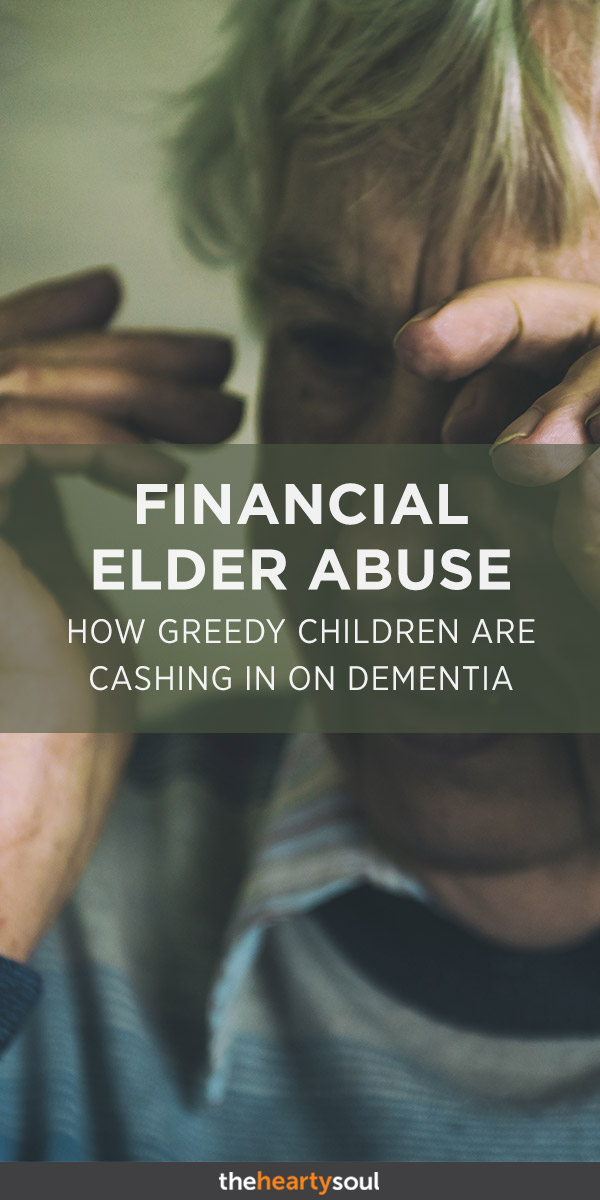Some time ago, we published an article about Granny Pods and how they could revolutionize elderly care and mean the end of nursing homes. It was truly inspiring hearing about a company that treats seniors’ golden years like… gold, let alone the fact that children wanted their aging parents close to home.
That’s why it’s heartbreaking when we come across news stories about greedy children who are literally cashing in on their parents’ dementia. In many cases, the adult children will even lead their aging mother or father to believe that the money will go into a house renovation so they will be able to move in.
But, without talking to them – if the kids ever really intended on doing that – change their minds leaving their parent(s) high and dry and abandoned in an old-age home. Quite frankly, it’s a form of abuse that is not talked about enough…
What Is Elder Abuse?

According to the World Health Organization, 15.7% of people 60 years old and up are victims of elder abuse. [1] This type of abuse is often defined as [2] “Any act or lack of action, within a relationship where there is an expectation of trust that harms a senior and causes them distress or risks their health or welfare.
It can happen anywhere, too… in seemingly happy homes, community centers, nursing homes, and more. Usually, you’ll hear stories about an abusive landlord, a paid care provider, or other people in positions of authority. Well, it can happen with friends and family.
There are many types of abuse, such as:

- Physical
- Emotional or psychological
- Sexual
- Neglect
However, it is easy to miss or overlook times when financial elder abuse takes place. Financial elder abuse refers to the misuse of funds and assets without the elderly individual’s full knowledge or consent, especially when it is not in their best interest. [2]
Read More: Couple marry again after husband with dementia proposes to wife he thought was his girlfriend
Watch Out: Examples of Financial Elder Abuse

In cases where a parent has been diagnosed with Alzheimer’s disease or other forms of dementia, family members may try to get mom or dad to transfer their money for any number of reasons. While it starts out small, it very well could escalate. Not only is that person taking advantage of someone who is not mentally sound, but they can coerce them into believing other family members are “out to get them.”
Elderly people also usually become victims of internet or phone scams… They’ll receive a call from a stranger claiming to be a tax collector or work for the government and request their information. Scared, intimidated, and confused, they give in and share private information that will eventually get their bank accounts hacked.
“I hear stories like this all the time where kids will say, ‘Listen mom, we’ll build you a granny [pod] in the backyard, you move into that, I’ll move my family into the family home,’ and they do that and the next minute they say, ‘Oh, we’re actually selling and mom’s in the street. She’s either homeless or they put her… into residential aged care. It’s very – it’s not difficult to do. Once you get durable power of attorney, you basically have the legal ability to do what you like with your parents.” [3]
Signs of Elder Abuse Everyone Needs to Know

It can be tough to catch, but some warning signs of elder abuse include: [2]
- Changes in mood (fear, depression, anxiety)
- Changes in behavior (detachment, social withdrawal)
- Changes in living arrangements (people being forced out or moving in)
- Neglect (poor hygiene, missed meals, dirty clothes)
- Physical harm (unexplained bruises, cuts, or other injuries)
- Inability to pay bills or unusual bank withdrawals
We hope this never happens, but if suspect someone in your family is participating in elder abuse, financial or otherwise, NICE (National Initiative for the Care of the Elderly) has a helpful acronym for you to remember. It’s called ABUSER:
- Acknowledge: Suspicion of abuse may develop over time. Accumulate and document evidence.
- Barriers: Fear of retaliation, withdrawal of caregiver support, and breach of confidentiality create barriers to seeking help.
- Urgency: Assess immediate needs and potential risk of physical harm.
- Screen: Assess a person’s physical, emotional, and mental capacity to help themselves.
- Empower: Educate the person about their rights and available resources. Assist with establishing a safety plan.
- Refer: Seek support from, or consult with other professionals.
Is Elder Abuse Illegal in North America?

Yes and no – the laws vary from state to state or province to province. In Canada, according to the Advocacy Centre for the Elderly, there is no law against elder abuse specifically. However, “many forms of elder abuse may be a crime,” including theft, theft by holding power of attorney, stopping mail with intent, extortion, forgery, and fraud. [5] For more information about how and where to report elder abuse, visit this Government of Canada link.
Carolyn Rosenblatt, a registered nurse and attorney, is an expert on this topic. First, she suggests reporting the financial elder abuse to your county’s adult protective services. They will expect you to have proof – names, dates, and other details. You can also contact the bank and speak to a manager about your parent’s dementia and the possibility of financial elder abuse.
“Laws vary from state to state,” says Rosenblatt. “But it is possible that the bank may be required to report suspected abuse to law enforcement also.” While elder abuse is unfortunate, it is a reality many aging mothers and fathers are facing. So, we hope these resources – if you ever need to use them – are of help to you and your parents.

Read More: Dementia Experts Say You Should Follow These 7 Rules to Keep Your Mind Sharp
Sources
- Elder abuse. (2018, June 15). Retrieved from https://www.who.int/ageing/projects/elder_abuse/en/
- Information about elder abuse. (n.d.). Retrieved from https://www.ontario.ca/page/information-about-elder-abuse
- TODAY. (n.d.). Retrieved from https://www.facebook.com/iwakeupwithtoday/videos/exploiting-elderly-parents/504539996684268/
- ACE | Elder Abuse – Frequently Asked Questions. (n.d.). Retrieved from https://www.advocacycentreelderly.org/elder_abuse_-_faq.php

